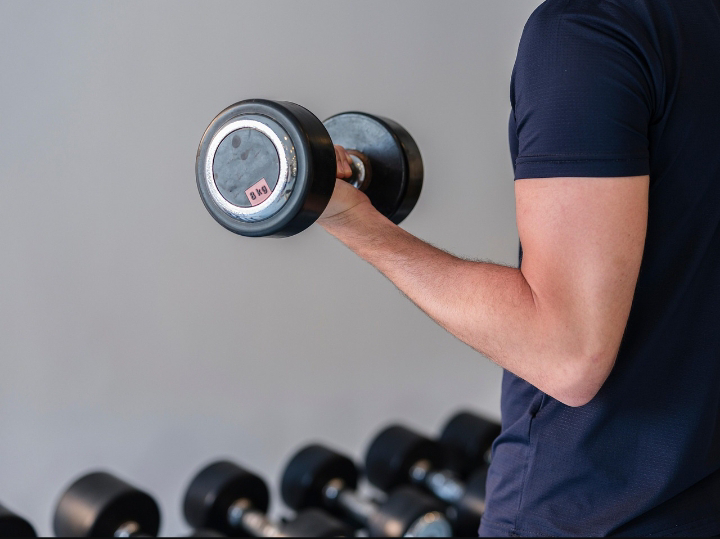What Is Muscle Degeneration and How to Fight It Naturally
What Is Muscle Degeneration and How to Fight It Naturally
Monica Saxena
| Wellness Blogger | Certified in Holistic Health & Nutrition | Fully
Accredited Professional Nutritionist |
However, muscles are more about the power or strength that helps you endure hardship on your body. It helps you get the physical task done and fills you with confidence after a round of strenuous physical exercise or work. The muscles don't just power your arms and legs—they're vital for strength, balance, movement, and even metabolism. But as we age, or if we lead a sedentary lifestyle, we often begin to experience something called muscle degeneration, or gradual muscle loss.
This post will help you understand what muscle degeneration is, why it happens, what early signs to watch for, and, most importantly, how to prevent or slow down muscle degeneration naturally.
What Is Muscle Degeneration?
Muscle degeneration refers to the progressive weakening or shrinking of muscles over time. One of the most common forms is sarcopenia, which is age-related muscle loss. It starts when we are in our thirties, but muscle loss becomes more prominent when we reach our fifties. After middle age, adults lose 3-5% of their muscle strength every year.
As muscle fibres shrink or die, you may notice weakness, difficulty in climbing stairs, trouble lifting objects, and poor balance. Muscle loss not only affects mobility, it also reduces energy levels and increases the risk of falls and fractures.
It can be due to the disuse of your muscles or neurogenic conditions (controlled by the nervous system). It can also happen when you are bedridden or unable to move due to a medical condition. Even if you are active, you can still lose muscle mass. It is treatable if we switch to regular exercise and proper protein consumption, but it takes longer to regain the lost muscle.
Common Causes of Muscle Degeneration
While ageing is a key factor, there are many other causes, like lack of physical activity, poor nutrition (especially protein deficiency), vitamin D deficiency, chronic diseases like diabetes, hypothyroidism, or arthritis, prolonged use of certain medications (like steroids), and hormonal changes, especially in women post-menopause
Muscle degeneration is the result of a combination of factors like lifestyle, diet, and medical conditions. One of the major causes is a lack of exercise, as when the muscles are not used regularly, they gradually shrink and lose strength.
Poor nutrition, especially low intake of protein, vitamin D, and important minerals such as calcium and magnesium, can lead to muscle wasting. These nutrients are all important for muscle repair and maintenance.
Hormonal changes during aging, such as low testosterone levels or low estrogen, are also responsible for causing muscle loss, particularly during menopause or after the age of 50. Other chronic diseases like diabetes, thyroid abnormalities, arthritis, and kidney disease can increase muscle wasting, too. Long-term use of certain medications, like corticosteroids, can weaken muscle tissue as well. All these factors can result in cumulative but appreciable loss of strength, mobility, and energy if not managed on time.
Early Signs and Symptoms of Muscle Loss
Muscle loss starts slowly but gradually, but we often tend to ignore it as an occasional occurrence. Later, it becomes a part of our life, and we fail to identify or notice the changes in our bodies right away. One of the earliest signs is a feeling of weakness during everyday activities, such as climbing stairs, lifting groceries, or rising from a chair.
You may also observe a decrease in muscle tone, where the arms and legs appear softer or thinner than before. Fatigue tends to set in more quickly during physical tasks, and your balance or coordination may start to feel off, increasing the risk of falls. Often, people take time to get up from a sitting or lying position, but they are clueless about what they are going through.
Another common symptom is a slower walking speed or a change in posture. Over time, these signs can progress if not addressed, making it harder to stay independent and active. Paying attention to these small but important changes can help you take early action to preserve muscle health.
Muscle loss in the elderly
Loss of muscle in the elderly may lead to a decrease in body strength and mobility and an increased risk of falls and injuries. So, it is critical to preserve and build body muscles, especially in seniors. Sitting and lying down for long periods of time can cause muscle fibres to break down, leading to leg muscles getting weak over a long period of time.
An easy way to avoid prolonged sitting hours is to take a walk or climb the stairs. A decline in walking ability can be seen with the progression of muscle degeneration. But strength training, like pumping iron, is the secret to muscle growth in the elderly.
Though ageing can bring muscle degeneration, or sarcopenia, muscle loss can be reversed or decreased by a healthy diet and reasonable exercise, which increases lifespan as well as improves quality of life.
How to Prevent or Slow Muscle Degeneration
You can slow down muscle generation if you take proactive steps to preserve and build muscle, even as you age. First, you have to make up your mind and stay positive, irrespective of your age, ailment, or physical issues. You need to decide and motivate yourself to be active and push yourself to lead an active and healthy life.
Preventing or slowing muscle degeneration involves a combination of healthy habits that support muscle strength, nourishment, and repair. One of the most effective strategies is to engage in regular strength-building exercises, such as resistance training, yoga, or bodyweight workouts, at least two to three times a week. Simple home exercises like squats, wall push-ups, or resistance band workouts are easy to do strength training exercises. Aim for 2–3 sessions per week.
Alongside physical activity, a balanced diet rich in protein—including sources like lentils, paneer, tofu, eggs, or fish curd, nuts, and seeds—helps repair and maintain muscle tissue. Include a protein source with every meal.
Vitamin D and calcium are also crucial for muscle and bone health, so it's important to get adequate sunlight exposure and include dairy products, green leafy vegetables, or supplements if needed. Talk to your doctor about supplements if needed.
Read How to get natural vitamin D
Staying physically active throughout the day, maintaining good hydration, and getting enough restorative sleep further support muscle recovery. By adopting these habits early and consistently, you can significantly reduce muscle loss and maintain your strength, mobility, and independence as you age. Brisk walking, yoga, dancing, or even light movement helps improve circulation and muscle tone. Remember to hydrate and sleep well; muscles recover better with enough water and quality sleep.
Read Staying Physically Active.
Foods That Support Muscle Health
Here’s a list of muscle-friendly foods:
- Paneer, tofu, and eggs are rich sources of protein and help build muscle strength. Protein-rich foods are essential, as protein provides the building blocks (amino acids) needed for muscle repair and growth.
- Legumes (dal, chickpeas, and moong) are plant-based proteins with the power to improve muscle strength.
- Spinach, Methi, Broccoli—Green leafy vegetables such as spinach, methi (fenugreek), and broccoli supply important minerals like magnesium and calcium, which are vital for muscle contraction and bone support.
- Nuts & Seeds—Healthy fats and muscle repair nutrients, omega-3 fatty acids, found in flaxseeds, walnuts, and fatty fish, help reduce inflammation and support muscle recovery.
- Bananas & Oranges—Fruits like bananas and oranges provide potassium, helping to prevent cramps and maintain muscle function. Read Superfoods
Daily Lifestyle Changes to Avoid Muscle Degeneration
Preventing muscle degeneration is not a major thing to do, but a small conscious decision integrated into your daily life. You need to incorporate healthy habits and protein-rich food and be physically active to avoid muscle wasting. Begin by incorporating regular exercise into your daily routine. Even 20–30 minutes of walking, light stretching, or resistance training can help.
Make protein foods a staple at each meal to aid in repairing muscles, and have proper, nutritious meals. Keep yourself hydrated, as dehydration contributes to impaired muscle function and recovery.
Spend a minimum of 7–8 hours on good sleep every night to give your muscles time to recover and regenerate. Avoid long sitting times by standing up at least once an hour to stretch or walk around. Finally, watch your posture, stress levels, and vitamin D levels—a morning sun exposure of a few minutes can maintain bone and muscle strength.
These minor lifestyle changes, if they become a part of your routine, can help in maintaining your muscle health significantly.
Muscle health is your foundation for healthy ageing. Healthtimber says by taking simple steps daily like moving more, eating better, and staying aware, you can stay strong, mobile, and independent longer.











Comments